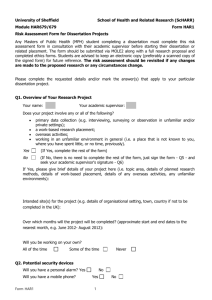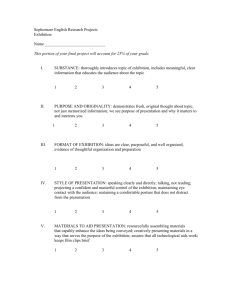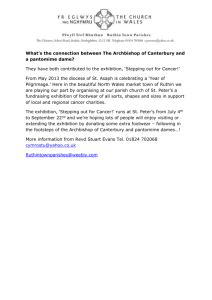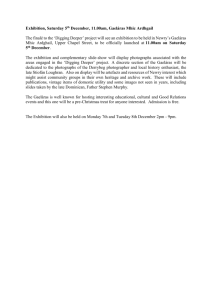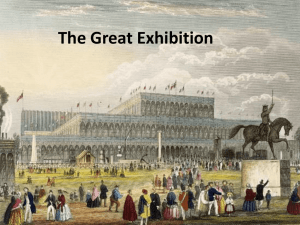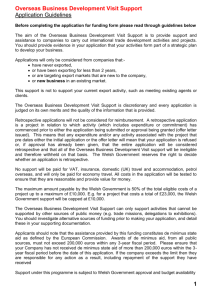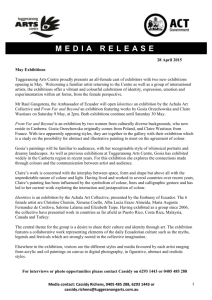131023freedompark - Parliamentary Monitoring Group
advertisement
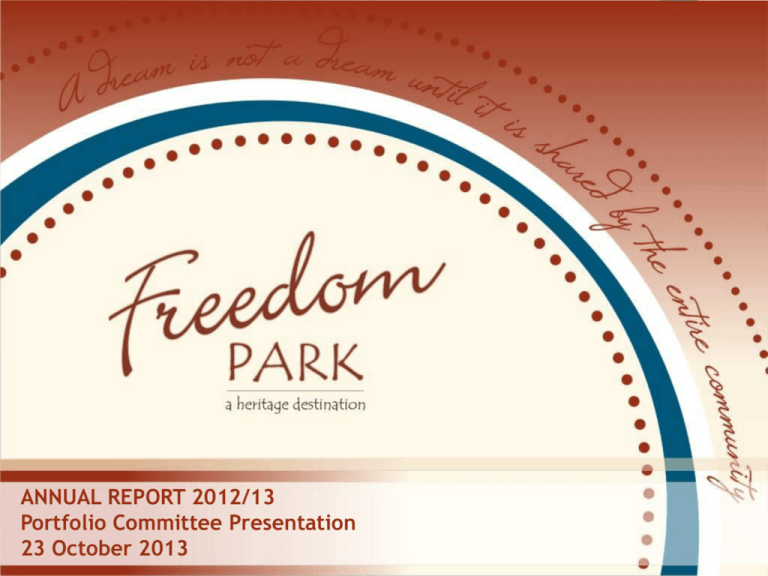
ANNUAL REPORT 2012/13 Portfolio Committee Presentation 23 October 2013 PRESENTATION OUTLINE • Introduction • Performance overview • Performance against key indicators • Budget and expenditure • Governance and audit outcomes • Outlook for the future MANDATE • Freedom Park is a statutory agency of the Department of Arts and Culture (DAC) • It comprises a memorial and monument that will narrate a story spanning a period of 3.6 billion years through the following seven epochs: – Earth – Ancestors – Peopling – Resistance & Colonisation – Industrialisation & Urbanisation – Nationalism & Struggle – Nation Building & Continent Building • It also has the Garden of Remembrance - to acknowledge men, women and children who contributed to the freedom of the country GENESIS “ …the day should not be far off, when we shall have a people’s shrine, a Freedom Park, where we shall honour with all the dignity they deserve, those who endured pain so we should experience the joy of freedom.” (Patron-in-Chief of Freedom Park, Former President Nelson Mandela, Umthatha, 1999) FREEDOM PARK VISION AND MISSION VISION • To be a leading national and international icon of humanity and freedom MISSION • To provide a pioneering and empowering heritage destination in order to mobilise for reconciliation, social cohesion and nation building in our country; • to reflect upon our past, improving our present and building our future as a united nation; and • to contribute continentally and internationally to the formation of better human understanding among nations and peoples. CORE VALUES • • • • • Tolerance of diversity Inclusivity Trust Transparency Accountability STRATEGIC OBJECTIVES • Complete Freedom Park project • Contribute to social cohesion, reconciliation and nation building • Establish mechanisms to promote, protect and preserve Indigenous Knowledge Systems (IKS) • Create a conducive environment in order to attract talent • Manage Freedom Park as a customer focused, financially sustainable cultural institution, aligned to the Golden Mzansi economy strategy. • To mobilize institutions through active partnerships LEGISLATIVE AND OTHER MANDATES • Constitution of the Republic of South Africa, 108 0f 1996 – Ch1: Human dignity, citizenship, national symbols – Ch2: Bill of Rights – Ch3: Compliance and adherence to Parliament as the supreme authority – Ch9: Schedule 3A Public Entity – Ch10: Adhere to basic values and principles governing public administration – Ch12: Alignment with recognition and role of traditional leaders – Ch13: Compliance with Treasury Regulations • Public Finance Management Act, 1 of 1999 • National Treasury Regulations • National Heritage Resources Act, 25 of 1999 • Public Audit Act, 25 of 2004 • Cultural Institutions Act, 119 of 1998 effective from 1 April 2009 • Outcome 12: Social Cohesion ELEMENTS OF THE PARK PROGRAMMES • PROGRAMME 1: Completion of the Park: //hapo Exhibition, staff parking and nursery construction • PROGRAMME 2: Research and Knowledge / Positioning: Reconciliation and Nation Building / Guest relations / Website / Event Management • PROGRAMME 3: Exhibition design and implementation / Archiving and Collections / Curatorship / Permanent Exhibitions / Knowledge Management / Contemporary and Indigenous Knowledge • PROGRAMME 4:Organisational development / Labour Relations / Performance Management / Recruitment / Human Resources Information System / Employee Wellness / Policy development / Rewards Management / Training and Development • PROGRAMME 5: Compliance / Support to Council, Management and Staff Members / Revenue Management / Asset Management / Procurement / Financial reporting and budget management / ICT Governance / ICT Systems and Solutions / Facilities Management / Commercial Services / Security Management / Building and Renovation Planning / Fundraising / Risk Management • PROGRAMME 6: Education and Training / Mobilisation PERFORMANCE OVERVIEW COMPARION WITH PREVIOUS YEAR MAJOR REASONS FOR VARIANCE • Discontinued projects – Nursery – Climate survey • Change to scope of work (e.g. staff parking) • Recognition of when a target is completed (e.g. \\hapo) • Targets dependent on the completion of //hapo (e.g. restaurant) • Administrative targets • Capacity constraints (e.g. fundraising) • Stripped of these constraints, performance was commendable, given that delivery was taking place in a changing environment PROGRAMME 1: COMPLETION OF PARK • At the end of March 2013 //hapo exhibition infrastructure was 99% completed and the exhibition content was 93%. The opening of the //hapo exhibition took place 22 April 2013. • An alternative staff parking area was identified and the design of the parking bays was scaled down to be more cost effective. Construction of the parking was done early in the new financial year. • Nursery construction was discontinued due to it being not financially viable PROGRAMME 2: RESEARCH • 3 050 names for inscription on the Wall of Names verified and validated • 2 research articles were completed: ‘The Reeds’ , “The Calvinia Coloured Community: A Symbol of Cape Jingoism” • Three research papers on //hapo storylines were completed: – //hapo Museum at Freedom Park: A post-Apartheid analysis; – Defining Inter-faith in SA: A Perspective from Freedom Park; – Ubuntu as given expression within Freedom Park. • In addition, numerous research pieces were completed for the development of content for //hapo epochs and storylines. • Four research pieces on historical international relations and an opinion piece on Robert Sobukwe were completed • Seven research papers for the Book Project were submitted. PROGRAMME 2: RESEARCH • Temporary exhibitions: – Papers on the transformation of the temporary exhibition in the Gallery of Leaders – Comparative analysis of Rwandan genocide and SA genocide was developed for a temporary exhibition on Rwandan Genocide. • A temporary exhibition on banishments was mounted. IKS research to enhance the storyline at //hapo within the national priorities was partially achieved. A 3-year research plan was reviewed with a research focus on reconciliation, nation building and social cohesion. • In addition, the following research proposals in line with reconciliation and social cohesion were drafted for implementation: – Calvinia Reconciliation Project – Calvinia Garden of Remembrance. PROGRAMME 2: POSITIONING • Data to establish baseline of target groups was not achieved • Plans developed but not approved in time: – Advertising, Public Relations and Communication, Outreach and Tourism and Marketing – Guidelines for cost-effective events management • However, free and paid advertisements, more extensive use of social media networks, and various features were placed on numerous magazines and newspapers • 5 out of 7 national holidays were held at Freedom Park • Outreach through 16 exhibitions and 5 community • Media presence in both print and electronic media increased • 6 joint collaborative initiatives with tourism • Production of information literature in accordance with the Brand Manual was achieved • Visitor flow and visitor satisfaction was partially achieved PROGRAMME 2: POSITIONING • Received two awards: – PMR Diamond Arrow Award, recognising the Park for its contribution to the economic growth and development of the City of Tshwane – Tshwane Tourism Award recognising Freedom Park as an interesting heritage destination • Improved marketing and brand awareness PROGRAMME 3: CURATORSHIP, ARCHIVING • Front-end evaluation workshops • The development and implementation of the audio system and language interpretation including braille in the seven epochs in //hapo was partially achieved. • The Audio-Visual hardware and film production was 96% completed at the end of the financial period. • 1 619 items were collected and 1 694 items were accessioned. • Regarding maintenance and provision of appropriate storage facilities and conditions for objects, a bulk file that complied with best practise of conservation was installed. • The draft file plan was being finalised in collaboration with National Archives. Furthermore, registry space was identified for use in the next financial year. PROGRAMME 4: HUMAN RESOURCES • Although Employee Surveys were not conducted in September 2012 and March 2013, focus group sessions to discuss the outcomes of the survey conducted in 2011 were held and a workshop on embedding organisational values was the first step in addressing issues that came out in the 2011 survey that needed attention was held. • A baseline and plan on reduction of employee turnover rate was established and the total staff turnover rate for the financial year was 5.9%. The staff retention rate based on the matrix that was developed was 92.3% for the financial year. • Staff complaints were addressed within timelines specified in grievance procedure Various HR policies were reviewed and updated • A Performance Management Workshop was conducted in October 2012 and another presentation was given at a staff meeting in February 2013. • All VIP modules licenced to Freedom Park were optimally utilised. • The payroll was executed accurately and timeously in terms of the organisation’s policies and in compliance with all applicable legislation • 4 EAP programmes were presented PROGRAMME 5: CORPORATE SERVICES • Except for some challenges with ICT, all targets in this programme were achieved and some exceeded. • ICT operations informed by strategic plans aligned to the business objectives was not achieved as the plan was deemed too costly • Although the ICT governance framework was approved by Council on 30 October 2012, a Steering Committee to decide on resource allocation and implementation of the Framework was not constituted • ICT systems and solutions acquired and implemented as required by the business due to non-procurement of the Building Management System. The tender processes is being re-initiated to appoint an electronics engineer and subsequently the system providerT • the Tender Evaluation Committee evaluated the tender documents for the acquisition of the Ticketing System • The scope of new updates for disaster recovery was partially achieved as the exhibition was still under construction. • PROGRAMME 5: CORPORATE SERVICES • The security awareness programme was reviewed and approved and bi-annual awareness sessions were presented to all staff. • Fire Emergency drills were conducted and an awareness session on Senior Management Vetting was presented to management. • The Health and Safety Policy was approved by MANCO for submission to Council. The draft Security Policy was placed on the Intranet for comments. • Regarding loading contracts onto the system with built-in controls, service reports for maintenance elements per contract were verified; however compliance was not monitored in the 2nd quarter and there was a deficiency in the internal controls. • Regarding management of the book shop and arts and crafts, a certificate for acceptable use of food premises and business operations was obtained from the City of Tshwane • Terms of reference for the appointment of a service provider were finalised and submitted to National Treasury for inputs before advertising. PROGRAMME 6: EDUCATION, PARTNERSHIPS • Signing of agreements (MOAs) and joint implementation of projects was partially achieved. • An MOA with Rhodes University was signed, which led to the joint hosting of the launch of the book that was authored by Dr Saleem Badat. • Several other MOAs were near completion. • 5 educational activities were developed; 16 educational activities in line with the school curriculum for different grades, and 13 educational programmes were developed, reviewed and analysed to ensure relevance of the educational needs of the target market. • In total 32 educational presentations were conducted during the financial period. DETAIL - PARTNERSHIPS • Partnerships with like-minded stakeholders and institutions enhanced the impact of our work, examples: – AFCON interfaith prayers – Women’s Day – Rhodes University and banishment project – HSRC seminar’s on Military veterans • Other MOUs – Institute for Justice and Reconciliation (IJR) – Institute for Healing of Memories (IHOM) – Hantam Municipality University of South Africa (UNISA) – Heritage Foundation – Human Sciences Research Council (HSRC) – NUUPATHSA – Restitution Foundation • Of particular significance was the strengthening of collaboration with the Voortrekker Monument, since the opening of the reconciliation road in December 2011. STRATEGIES TO OVERCOME UNDERPERFORMANCE Temporary exhibitions: With the completion of the permanent exhibition, the development of temporary exhibitions will be fast tracked in the new financial year. Already, a Human Trafficking and Nelson Mandela exhibition were held, and another is planned during the 16 days of exhibitions Tourism Marketing Plan: A well thought, carefully crafted tourism and marketing plan to usher Freedom Park to another level for implementation has been developed. Further to identifying the target markets and strategies to reach, retain and expand on the existing markets, the strategy delineates how best to effectively and efficiently profile Freedom Park through advertisements. Outreach plan: In order to increase the volumes of visitors to Freedom Park, an aggressive outreach plan to take Freedom Park brand to villages, towns and cities across South Africa and the African Continent will be rolled out. Marketing and promotional materials will be distributed to all targeted markets and the public at large, using various channels including social groups such as churches, youth forums, women’s groups and a range of other institutions such as schools. Efforts will be made to familiarise every school learner and pre-scholar with the Freedom Park brand. STRATEGIES TO OVERCOME UNDERPERFORMANCE IKS research • All IKS projects have been centralised in the Heritage and Knowledge Department. Audio system and language interpretation • Develop the language interpretation plan and Braille after the completion of content installation. This will ensure that the exhibition is interpreted in all official languages, the plan will be informed by the national language policy. The National Council of the Blind will be consulted to ensure that Freedom Park meets the needs of the client. Research on //hapo epochs and storylines • More attention will be devoted to this area of research now that sufficient content on //hapo epochs and storylines for permanent exhibitions has been delivered. Researchers will be given more time for research, fieldwork and writing fully-fledged papers. STRATEGIES TO OVERCOME UNDERPERFORMANCE Collection and accessioning • A collection development plan guided by the //hapo storyline will be developed. Archival processing standards will be developed to guide the accessioning, cataloguing and electronic archiving processes of materials and objects. Object conditions • An object management plan and process flow manual will be developed to guide the assessment of object conditions and for reporting purposes. Records management system • The file plan will be submitted to National Archives for final approval. An implementation plan will be developed to guide the process of establishing the Registry office. STRATEGIES TO OVERCOME UNDERPERFORMANCE Communication plan • Develop a fully functional Internal Communication plan, and ensure that every employee of Freedom Park is empowered with the vision, mission, values and programmes of the organisation. Information Communication Technology (ICT) • 3 year ICT strategy to be reviewed and brought in line with reasonable expectations. • Establishment of the ICT steering committee dependent on the organisational committee review to be performed by Corporate Governance. Inputs will be provided during the review. • Reporting on ICT system solutions dependent on the award and implementation of systems following the tender process. • Update and review of the data backup and recovery process. STRATEGIES TO OVERCOME UNDERPERFORMANCE Building inspection checklists • Maintenance checklists will be included as part of the monthly and quarterly reports. A calendar will be developed with set reminders for specific monthly submission dates for the monthly checklists. Building management system • Appointment of an Electronics Engineer who will be responsible for the design and implementation of the building management system. The building management system will also include a contract management component that will monitor the built in service frequency as per the contract. Retail services • Procurement processes for the appointment of a service provider for the retail services will be concluded in the new financial year. STRATEGIES TO OVERCOME UNDERPERFORMANCE • The Fundraising portfolio will have to be totally overhauled and a new approach employed. • A new plan will optimise on the relative strength of the Freedom Park brand including its good governance, financial and auditing track record over the years • This would require scanning potential corporate sponsors and commission deeper engagements with them and ultimately isolate attainable joint programmes with them whilst co-branding for mutual benefit. FINANCIAL REPORTING • Freedom Park (FP) faces a major challenge where operational grants received in the past financial years as well as the coming financial years are not covering operational expenditure incurred and to be incurred in the near future. • These challenges are already being experienced at the early stages of Freedom Park’s life cycle; where the Park is not yet at the stage where it can generate revenue required to operate and maintain current and newly built facilities. • Operational grants have only grown marginally against the operational requirements of FP. This has put a strain on the organisations’ budget. • Assistance from the Department of Arts and Culture (DAC) were received through the transferring of municipal accounts to the Department of Public Works (Paid for by DAC) amounting to an estimated R4 million per annum. • Further assistance was obtained from DAC through the infrastructure maintenance grant amounting to R4.3 million. FINANCIAL INFORMATION 2012/2013 Sources of revenue Operational grant 2011/2012 Estimate Actual Amount Collected (Over)/Under Collection Estimate Actual Amount Collected (Over)/Under Collection R’000 R’000 R’000 R’000 R’000 R’000 62 301 62 751 (450) 60 403 60 403 0 Admission fees 818 693 125 875 622 253 Venue hire 347 299 48 277 306 (29) 0 82 (82) 0 71 (71) 5 600 7 010 (1 410) 1 800 9 938 (8 138) 69 066 70 835 (1 769) 63 355 71 340 (7 985) Other revenue Interest revenue Total Explanation of above table: • Under collection of admission fees were due to the delays in the opening of //hapo, therefore impacting on the overall revenue generation capabilities of the Park. • Over collection of revenue on the operational grant was due to an additional grant obtained from the Department of Tourism for the funding of an intern programme. • Over collection relating to interest revenue was due to the delays experienced in the capital outflows of the capital budget. • An adjustment budget was approved mid financial year to ensure that over and under collections will not materially PROGRAMME EXPENDITURE 2012/2013 Programme Name 2011/2012 Budget Actual Expenditure (Over)/Und er Expenditure Budget Actual Expenditure (Over)/Under Expenditure R’000 R’000 R’000 R’000 R’000 R’000 Programme 1 12 601 14 032 (1 431) N/A 16 086 - Programme 2 10 268 13 130 (2 862) N/A 6 755 - Programme 3 5 879 2 997 2 882 N/A 4 770 - Programme 4 43 814 38 306 5 508 N/A 32 437 - Programme 5 2 576 2 604 (28) N/A 3 500 - 75 138 71 069 4 069 N/A 63 548 - Total The table above indicates that: • Prior year budget information was not available due to the fact that the new framework for performance information only became applicable in the 2012/2013 financial year ensuring budgeting per objective and target performance. • Under expenditure on the adjusted budget (adjusted for surplus retention) was due to the late approval of surplus retention. • A substantial amount was not spent on programmes related to: – the opening of //hapo (opening delayed to the next financial year) – repairs and maintenance (replacement of lights done in a more cost effective manner). CAPITAL INVESTMENT, MAINTANANCE AND ASSET MANAGEMENT • Listed below is a table indicating capital projects implemented in the 2011/2012 and 2012/2013 financial year. • Note that some projects were not implemented and were therefore not listed, due to the fact that Freedom Park focussed on the opening of the new museum //hapo. • The reconciliation road was practically completed in the 2011/2012 financial year with final completion achieved in the 2012/2013 financial year. A saving of R1.4 million was achieved on this project against the initial estimated costs. • Note that other projects listed were not financial year specific or had not yet been fully completed, for example the engravings funding will last for several financial years as names are identified, verified and inscribed. • The exhibition development project was not fully completed by end of financial year; however there were significant savings in the estimated project costs. • A significant increase in equipment maintenance costs and facilities management costs are expected over the next MTEF period due to the opening of //hapo. • Although the facilities of Freedom Park are generally in a good condition, a valuator will be appointed in the next financial year to reassess the expected useful lives of infrastructure assets which may have an impact on the financial statements. CAPITAL EXPENDITURE 2012/2013 Infrastructure projects Engraving – wall of names Reconciliation road 2011/2012 Budget Remaining Actual Expenditure (Over)/Under Expenditure Budget Actual Expenditure (Over)/Under Expenditure R’000 R’000 R’000 R’000 R’000 R’000 3 984 698 3 286 3 990 6 3 984 1 486 33 1 453 2 238 752 1 486 9 568 1 702 7 866 0 0 0 66 504 49 395 17 109 113 802 47 298 66 504 81 542 51 828 29 714 120 030 48 056 71 974 //hapo restaurant and coffee bar Exhibition development Total REVENUE PROJECTIONS Operational Grant Freedom Park’s operational grant has not increased in line with its organisational development as well as inflation. The following graph depicts the growth trajectory of the grant received from DAC: Grants received: Operating 80,000,000 60,000,000 40,000,000 20,000,000 Grants received: Operating - 10/11 11/12 12/13 13/14 14/15 15/16 16/17 The grant received over the past 2 years and next 3 years only grew with an average of 5.15%. The 2014/2015, 2015/2016, 2016/2017 grants amounts to R70 470 000, R73 711 620 and R77 618 336 respectively. The growth is so small that it barely carries the cost of the salary and commodity escalations over the MTEF. Therefore, alternative funding is essential for the sustainability of Freedom Park. REVENUE PROJECTIONS Admission Charges and Venue Hire Revenue Due to the limited financial growth in the operational grant it is essential that Freedom Park generates it own revenue to ensure its sustainability. The following graph indicates the admission fee growth projection required to fill the gap between the operational grant increase and the actual growth requirements to sustain Freedom Park: Admission Fees 7,000,000 6,000,000 5,000,000 4,000,000 3,000,000 2,000,000 1,000,000 - Admission Charges 10/11 11/12 12/13 13/14 14/15 15/16 16/17 Freedom Park has demonstrated significant growth over the past three financial years, admission fee revenue increasing from R310 222 (2010/2011) to R622 081 (2011/2012) and a further 11% in the 2012/2013 financial year (R693 145) To ensure sustainability admission fee revenue has to increase from a projected R808 516 (24 720 visitors) in 2013/2014, to R3 282 217 (49 124 visitors) in 2014/2015,to R6 005 127 (86 550 visitors) in 2015/2016 and to R6 605 639 (95 205 visitors) in 2016/2017. REVENUE PROJECTIONS Interest Revenue In the past Freedom Park relied on interest revenue to sustain its business, however a significant drop in funding is expected over the MTEF due to the utilisation of the capital grant. The following graph indicates the interest revenue projection over the MTEF: Interest Received 12,000,000 10,000,000 8,000,000 6,000,000 4,000,000 2,000,000 - Interest Received 10/11 11/12 12/13 13/14 14/15 15/16 16/17 Interest revenues has significantly decreased from R9 938 196 (2011/2012) to R7 010 276 (2012/2013). Interest revenue will not compensate for the lack of other revenue growth over the MTEF as it has in the past. STAFF COSTS PROJECTIONS Staff Costs Significant staff cost increases were experienced over the previous MTEF due to organisational growth. The grant allocations have not grown at the same rate as staff costs. Basic salaries increased with 9% from the previous financial year (Including performance based increases) The new budget assumption utilised made for the provision for restructuring in the 2013/2014 financial year resulting in minimal growth of staff costs from 2013/2014 to 2014/2015 amounting to an increase of only 2.88% and maintaining future growth of staff costs below 6.5% per annum. The following graph indicates the staff cost projection over the MTEF: Staff Costs 60,000,000 50,000,000 40,000,000 30,000,000 STAFF COSTS 20,000,000 10,000,000 - 10/11 11/12 12/13 13/14 14/15 15/16 16/17 GOODS AND SERVICES Goods and Services Due to budget reprioritisation and cost saving measures implemented Freedom Park was able to reduce expenditure of goods and services by an average of 5% over the pervious MTEF from R33 million in 2008/2009 to R26 million in the 2012/2013 financial year. Goods and Services 35,000,000 30,000,000 25,000,000 20,000,000 Goods and Services 15,000,000 10,000,000 5,000,000 2012/2013 2011/2012 2010/2011 2009/2010 2008/2009 FINANCIAL FOCUS AREAS GOING FORWARD Focus Areas: • Exceed the budgeted number of visitors by implementing a sound marketing strategy and aggressive marketing, retaining regular customers such as schools and universities. • Fully utilise the facilities of Freedom Park for commercial services for venue hiring, equip facilities and train staff. • Appropriately implementing restructuring with the objective to minimise positions to ensure an adequate saving on salaries in the 2014/2015 financial year. • Secure future infrastructure maintenance grants by appropriately spending and reporting on the current grant received. • Cost cutting/saving initiatives implemented on a year on year basis. • Alternative sources of funding for other projects such as from NLB and fundraising • Partnerships with likeminded institutions, sharing costs and achieving objectives • Implementation of new ticketing, accounting and events management systems – Eworkflow (paperless) GOVERNANCE AND AUDIT OUTCOMES • Freedom Park has achieved a clean audit for the third year in succession • Only reported findings relate to: – Restatement of corresponding figures • Activist fully functional council, with the following sub-committees: – Audit Committee – Finance Committee – Bid Adjudication Committee – HR and Remuneration Committee – Strategic Committee – Ethics Committee • Internal audit and risk management functions (incl. fraud prevention) • Code of conduct • Corporate Governance Unit headed by a Company Secretary • CFO is a qualified chartered accountant FUTURE OUTLOOK • Ensuring financial sustainability of the Park • Realign the organisational structure with strategy to optimise delivery • Ensuring full operationalisation of the new museum, //hapo. • Strengthening existing partnerships with stakeholders and communities • Implement a marketing strategy that places major focus on a national drive to increase numbers and promote local tourism. In this regard, the major focus of our outreach will be on schools, embassies, and international markets. • As a contribution to reconciliation, social cohesion and nation building, we shall fully implement the Reconciliation Project in Calvinia, which will be rolled-out to other provinces, starting in KwaZulu-Natal, Mpumalanga and the Free State. • Establish the Knowledge Centre: Production of knowledge that is foregrounded in IKS, and create spaces for national dialogue. THANK YOU
